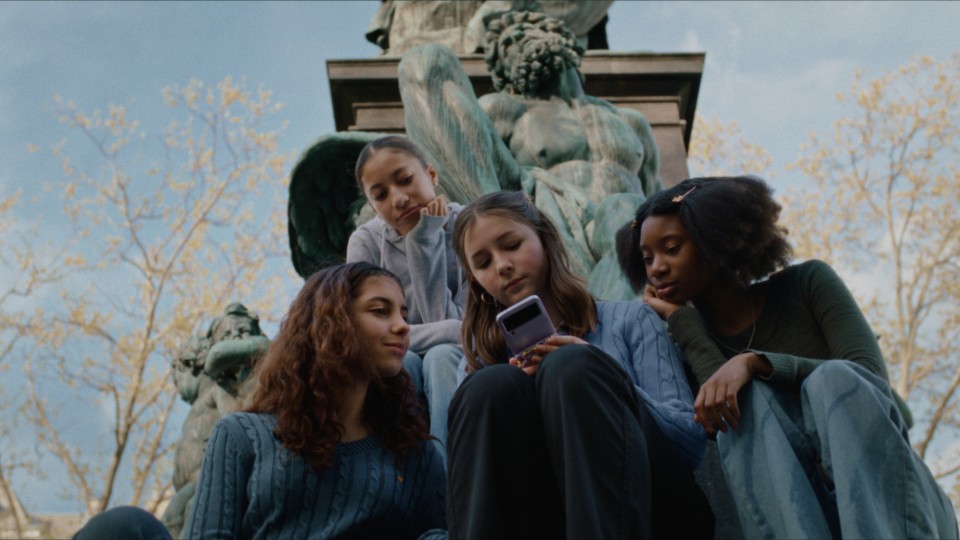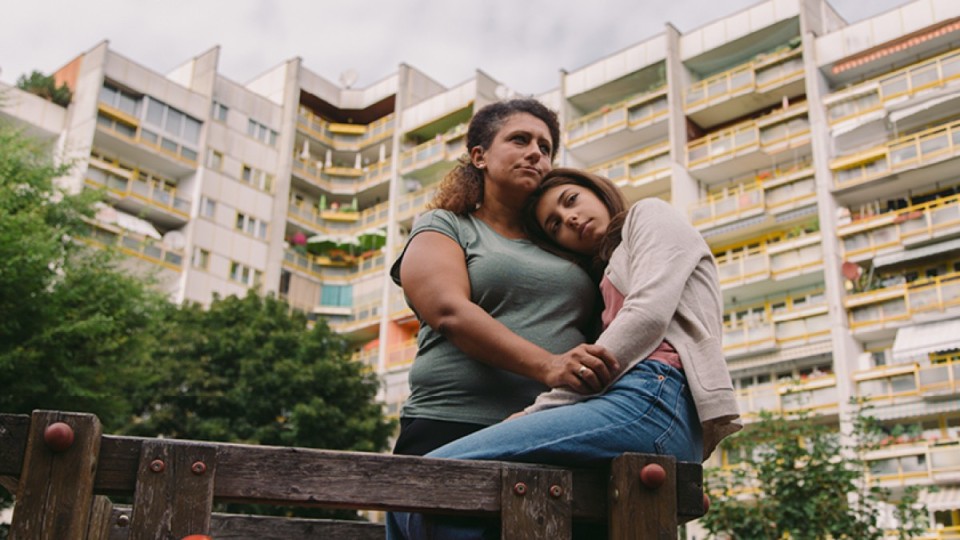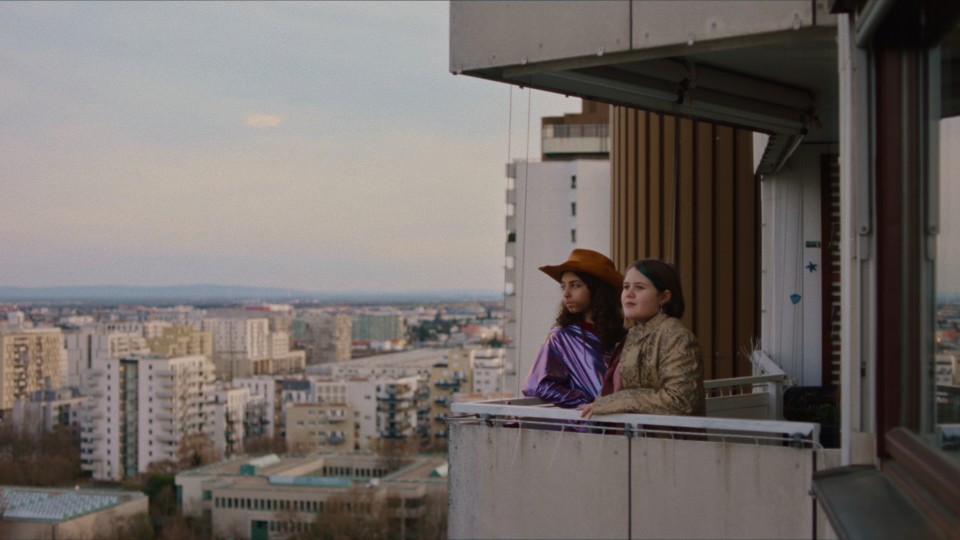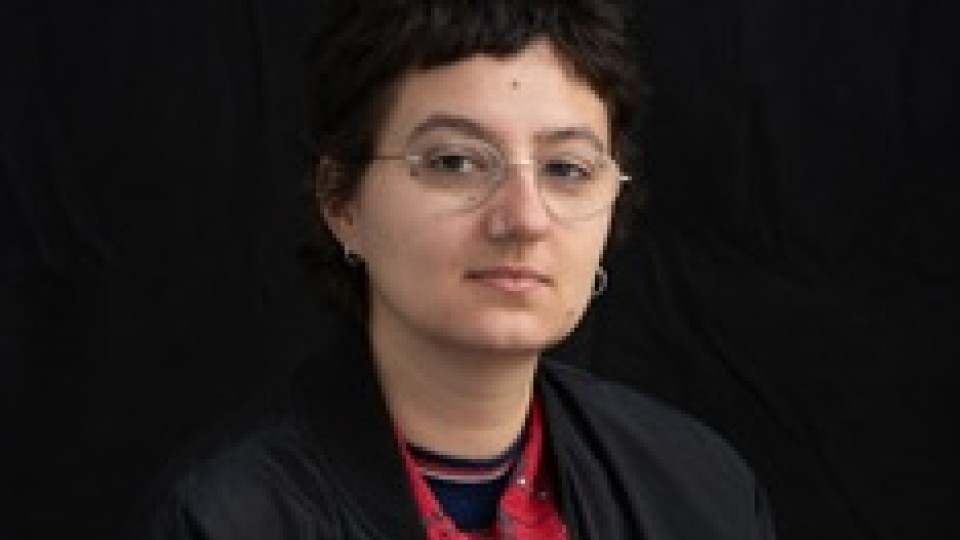For Anna, the signs indicate that changes are coming. She’s twelve years old, starting at a new school, discovering new opportunities
– and also their price. WHEN YOU ARE AFRAID, YOU PUT YOUR HEART INTO YOUR MOUTH AND SMILE is both the title and the agenda. Because in the world of Marie Luise Lehner's feature film debut, social conditions are the
way we know them but at the same time a little different, a little gentler, a little more relaxed and more open to adopting
an unusual perspective on things.
Anna, the protagonist, has just started at a prestigious high school which is supposed to open the doors for social advancement.
She is also twelve, in the middle of a phase of inner and outer transformation. Is the aspect of transition in many ways the
central theme of your first feature film?
MARIE LUISE LEHNER: Transformation is a fine, important topic. Many films depict a character who resolves independently to do something, defying
the (perhaps repressive) circumstances in order to achieve a goal, a personal ambition. The narrative that dominates here
is: You just have to want it, and then you can do it. Social conditions often aren’t portrayed in any detail. My film is less
about a character's journey to a destination and more about circumstances. Recognizing your own position. The characters each
have a different status in society. They are depicted and taken seriously within that.
In Anna's new environment, social disparities are quite evident. But your film doesn’t feature oppressive relationships of
dominance or pronounced antagonists. Why is that?
MARIE LUISE LEHNER: There are power relations but no clear good and evil. Everyone acts within the scope of their possibilities. The rich children
invite Anna to a birthday party, so she could become a member of their group, but that doesn’t happen. Because she brings
a home-made present instead of one bought in a shop, for example. Because in the apartment she sees how long the dining table
is, that there are sophisticated dimmer switches, and she feels the difference to her own home. She feels alien. That's how
it is with class differences; people who don't belong in a certain circle feel very strongly that they don't belong. The children
are all sweet. In my film, social difference isn’t a personal problem; it’s a social one.
Social shame is a crucial element here, even though you portray Anna as a very self-confident girl.
MARIE LUISE LEHNER: I wanted the story to show that she starts the film proudly and ends up proudly. The shame she is confronted with in the course
of the narrative doesn’t so much come from inside her: it’s more imposed upon her. She stumbles but does find a way to regain
her self-confidence, thanks to the lovely relationship she has with her self-confident mother. I was interested in a story
about people who do everything as well as they can, with the means at their disposal. But social conditions get in the way.
Anna, with her single, deaf mother, is not a member of a socially brutalized lower class; she’s a person who is excluded because
of circumstances. Is it class? Is it ableism? Is it racism? For people like Anna's mother, access to education is a question
of language, not intellectual ability. Social conditions often result in people not achieving what they could, even though
they are smart, competent and loving people.
Why did you largely omit the performance aspect of school life?
MARIE LUISE LEHNER: I was more interested in everything that takes place outside of school hours. But Anna reaches a point where she can no longer
keep up in maths lessons, and that’s when the first rift between her and her mother emerges. It’s not only the school's standards
of performance that cause an estrangement between mother and daughter. Anna also encounters other realities of life and other
living situations. Moving up the class hierarchy is one of the many transitions that my film depicts. The transition to becoming
an adult is another. Anna and her mother have a very loving relationship, but we can foresee a time when they will become
estranged from each other.
IF YOU ARE AFRAID YOU PUT YOUR HEART INTO YOUR MOUTH AND SMILE is a very encouraging title, slightly absurd and definitely
long. Is this title based on a literary source?
MARIE LUISE LEHNER: The title is a quote from Aglaia Veteranyi's novel Why the Child is Cooking in the Polenta. It was a very important book for me. It’s about growing up from a child's perspective. Aglaia Veteranyi fled the Ceausescu
regime in Romania with her family and wrote this semi-autobiographic novel in simple, very precise, touching language that
meanders into the lyrical.
How did you manage, during the screenwriting process, to access the life and language of people who are 12-13 years old today?
MARIE LUISE LEHNER: I’m lucky enough to have three much younger sisters. The two youngest are now just ten and fourteen years old. They were an
important source during the writing process. I also worked with the young people who appear in the film. They all go to the
school where we filmed. I cast them in groups of friends, because I wanted them to know each other, to feel comfortable and
safe with each other. I thought that approach made a lot of sense. Filming is 90% hanging around, so if you’re with friends,
the atmosphere is more relaxed. In fact, I myself and the whole team benefited enormously from having such a respectful working
atmosphere.
How did you choose Siena Popović to play Anna? How did you prepare the young people for filming?
MARIE LUISE LEHNER: Siena became our protagonist because she was so smart. During an improvisation exercise in auditions, she had to explain
to a classmate that her mother was going to have an abortion, which the classmate couldn’t really relate to. When we did that
exercise, Siena was the only child to argue that it’s a financial issue. I thought it was very clever for a twelve-year-old
to appreciate that having another child is also a class question. Siena is extremely ambitious and a good student; she speaks
several languages, and she’s an achiever. We had shorter shooting days with the children on set, and we voluntarily implemented
the new child protection concept. The general feedback from the team was that they’d never experienced a set like that before,
even though with 20 children, just getting the right children in the right outfit in the right place at the right time is
a real challenge.
How did you find Mariya Menner, the actress who plays Anna's mother?
MARIE LUISE LEHNER: We put out a call to associations for deaf people. Finding a deaf person who knows spoken and sign language isn’t so easy.
Mariya can do both. She is a very charismatic and funny, a cool, beautiful woman who has four children of her own. To facilitate
working together, we always had a sign language interpreter with us on set and at rehearsals.
Sign language is one of many elements of physicality in your film. How important is the body in your narratives?
MARIE LUISE LEHNER: The body is very important to me. There are different bodies in different life situations, and that also applies when people
are denied control over their own bodies for social reasons. In patriarchal society, a mother often doesn’t have control over
her own body. With the shift to the right evident around the world, dealing with the topic of abortion in a film has become
even more political than it was when I wrote the screenplay. Gender transition is completely under attack right now. Trans
people in my environment are very scared at the moment. It’s crazy how much antagonism there is to the idea that people should
be allowed to dispose of their own bodies. This is a very important feminist issue. I have to be the only person who is allowed
to make decisions about my body.
Anna feels attracted to a girl and to a boy. How important was it to you to bring in gender fluidity?
MARIE LUISE LEHNER: At the end, Anna says: I don't like Paul; I want to be Paul. That can mean a lot of things. Paul comes from a different kind
of family and has no financial problems. He’s a blond boy who gets a lot of attention: he sits on the floor before choir rehearsal
and burps. We don't know why she wants to be Paul, but there are several possible ways it might be desirable for her to be
him. The nature of her true, innermost wish remains undefined.
How did Daniel Sea come to be part of your cast?
MARIE LUISE LEHNER: I watched The L World as a teenager, which was somehow identity-building. At that time (and even today) there was very little lesbian and queer
representation. This series, with Daniel Sea as a trans man, was a first on television. It was a great honour for me to have
him in our cast. We know each other because we both studied with Ashley Hans Scheirl at the Academy of Fine Arts in Vienna.
So it's not just me as a teenage fan; we also share a connection to New Queer Cinema.
Explicit antagonists don’t feature in your film, and neither do exclusionary mechanisms. There is solidarity... Are you depicting
a utopia – a desire for social change or the possibility of a different society?
MARIE LUISE LEHNER: Film always offers the opportunity to show utopias. On the other hand, I also show a realistic idea of how a society can
be and sometimes is. There are no simple answers to complicated questions in the world. There are only more complicated answers.
Everything in the world is ambivalent. I could have shown Anna being bullied more; children in the real world are probably
more merciless than in my film. I didn't want to convey the feeling that blame should be assigned on the basis of bad behaviour
by individuals. I didn’t want to set the stage for simple conclusions to be drawn. Any violence I showed would perpetuate
that violence. It’s enough to hint at violence without showing it. I want to adopt a certain attitude with the film that is
on an equal footing with the characters, rather than creating an opportunity for the film to look down on the characters.
I want to show them in their subjectivity. I don't want to portray any victims.
Interview: Karin Schiefer
January 2025
Translation: Charles Osborne






